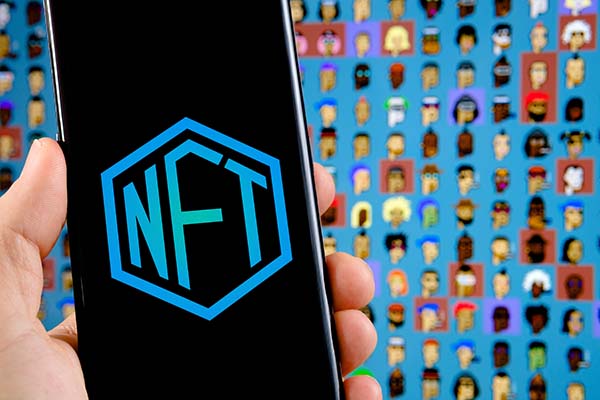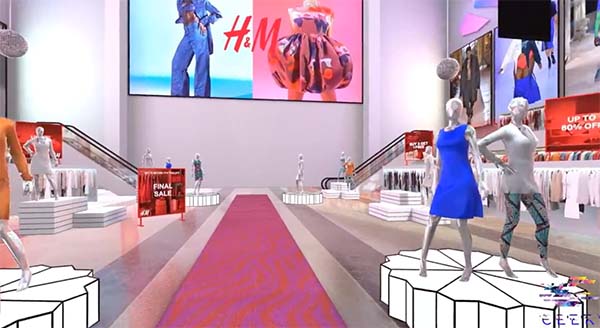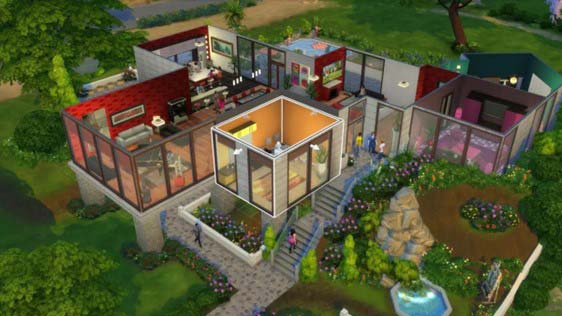By Kymbal Dunne
Have you ever thought that it’s just easier to live in another world than here?
I’m sure if you were in war ravaged Ukraine you’d wonder if real estate would ever have its value again. In wealthy Australia where Sydney’s median house has a value of $1.4m you’d wonder as a young adult if it was ever going to be anything more than a dream. If you were Elon Musk, then the dream isn’t about Earth at all anymore, it’s Mars. For our gaming community the world is already virtual, and their characters are avatars that have acquired digital wearables.
For me, I see confidence building in the virtual world. I’m told by so many people about the value of physical art. Recently the famous painting Blue Poles by American artist, Jackson Pollack, which was acquired rather controversially by the National Art Gallery in 1973 for $1.3m was just valued at $500m. That’s an astonishing 12.64% annual capital gain. But where do you keep that prized investment, how do you protect it and insure it and how much land and building do you need to surround it to showcase it.

Visa were reported to have paid USD $150,000 for this CryptoPunk 7610 NFT-based digital avatar in 2021
NFT’s (Non-Fungible Tokens) can be acquired and stored on your phone. They can be easily shown to friends, hung on your wall, just like a photo but more importantly they can be bought, sold and traded at ease and quickly. Some say it’s not real art but it is art, what’s strange is how easy it is to access. So, the art world has now changed. The ABC news recorded in 2022 that the value of the traditional art market was worth $68 billion and the NFT art market, $56 billion. What has taken an eternity to create with physical art has taken such a short time to replicate with digital art.

Let’s turn our sights to real estate - physical land and solid buildings. It is now part of the virtual world, and I can see reasons for why that situation will gain momentum. In my view there will be a strong virtual real estate market and I believe this will impact how we investigate and trade physical real estate.
For the top global fashion houses, like Louis Vuitton, Chanel, Gucci and Prada they have moved into virtual buildings where they can showcase their style and fashion. Why not when they have gone as far as they can with physical real estate in major cities, department stores and duty-free outlets. Yes, virtual sends a single message to a universal audience.

Still doubt me?
Ask yourself why Assassins Creed is marketed both physically as a boxed set and digitally as a download? Sony’s digital sales of full game software accounted for over 50% of sales. Just look at shopping practices in America where retailers are also doing more than 50% of their sales on-line. The shopping mall is traditionally a physical asset but unless the mall has a digital presence it will miss out on sales and consumers will miss out on current and trending experiences.
So, I had a conversation with ChatGPT to find out what the advantages are, here is the verdict.
- Cost-effectiveness: Virtual real estate ownership is typically less expensive than physical real estate ownership.
- Flexibility: Virtual real estate can be accessed from anywhere in the world and can be easily reconfigured or expanded as needed.
- Ease of transfer: Virtual real estate can be easily transferred or sold, without the need for physical transfer of property because of smart contracts.
- No physical maintenance: Virtual real estate does not require physical maintenance or repair, making it easier and less expensive to manage.
- Increased accessibility: Virtual real estate allows for increased accessibility, as there are no physical barriers to entry, such as geographic location or mobility restrictions.
- Customization: Virtual real estate can be customized to meet the specific needs of the owner, including design, layout, and functionality.
- Potential for high returns: Virtual real estate has the potential to generate high returns, especially in growing virtual communities or marketplaces.
Then I asked ChatGPT about luxury brands and their relationship with virtual real estate.
Fashion houses are acquiring virtual real estate for several reasons, including:
- Brand exposure: Virtual real estate provides a new platform for fashion houses to showcase their brand and products, reach new audiences, and build brand recognition.
- Customer engagement: Virtual real estate allows fashion houses to interact with customers in new and innovative ways, through virtual experiences, online events, and other digital marketing initiatives. For instance, so much money is being made in the cryptocurrency market that new wealth is being created and the fashion houses see this as a new frontier for their expansion. “You have to meet people where they are” and that’s the digital landscape.
- Increased sales: By creating a virtual presence, fashion houses can reach customers who might not have access to physical retail stores and increase their sales.
- Cost savings: Virtual real estate can be a cost-effective alternative to physical retail spaces, reducing overhead expenses and allowing fashion houses to allocate resources elsewhere. For instance, Louis Vuitton has 5,003 stores in the world. Think about the savings from regular window installations in 5,000 global stores versus a single digital campaign.
- Sustainability: Virtual real estate can support sustainability efforts by reducing the need for physical retail spaces and reducing carbon emissions associated with transportation and manufacturing.
- Innovation: Virtual real estate provides a platform for fashion houses to experiment with new technologies, such as virtual and augmented reality, and to create innovative and immersive experiences for customers.
In 1991, Will Wright, a game designer lost his home to a fire and wanted to build a dolls house, so he did so digitally. In 1997 the game Sims was released whereby you could build a life, a house and be part of a community. This game has sold almost 200 million versions. It is virtual but the outcome is real, desirable and highly profitable. I remember my kids playing Sims a long time ago.

Today, The Sandbox and Decentraland are virtual worlds/metaverses that allow users to buy, sell, customize, build and trade virtual real estate and NFT collectibles. They too are striving to create a community and a landscape for brands to thrive, globally. Snoop Dog is building a mansion on The Sandbox and the neighbouring land has been acquired for USD $450,000.
Finally, where I see potential is in owning real property and creating an NFT which mirrors the physical asset. The NFT could have all property specific history attached to it. Imagine the provenance. Land surveys, building approvals, marketing videos, architectural plans, all stored within the NFT. Imagine a special property with a smart contract that remits a selling commission back to the original owners every time the property changes hands. Now, if the NFT can be traded within seconds and money passed equally as fast then imagine how physical real estate can be accessed by many more buyers. Of course, trading of real estate would be subject to the timeframes of current land settlement procedures which are cumbersome, the nature of the pace of trading NFT’s will put pressure to speed that process up.
Whether in the digital world or the real world the technology around real estate is evolving and now capturing the imagination of many more people. This interest and easier access will be the next phase of progress in real estate.
Thank you to Kymbal Dunne, Director at Trusted Property Advisors kymbaldunne.com and REINSW Commercial Chapter member for allowing REINSW to use this article.